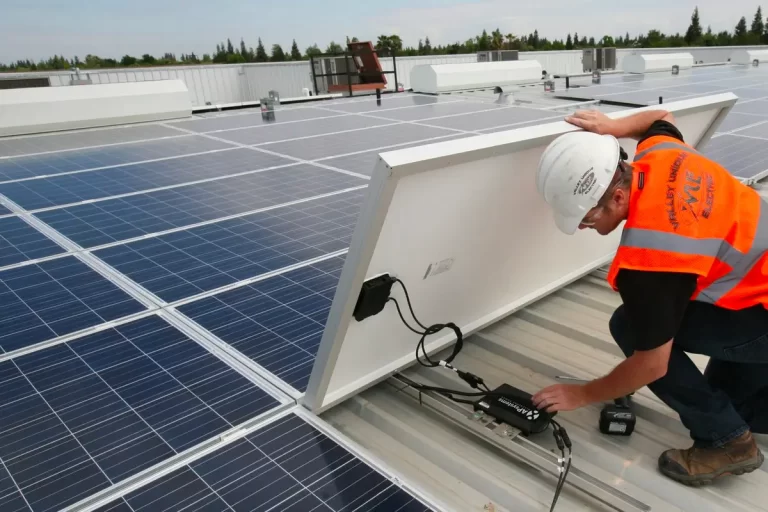Why Microinverters Are Ideal for Residential Solar Systems?

Microinverters offer significant advantages for residential solar systems. Unlike traditional string inverters, which connect multiple panels in a series, microinverters are installed on each individual panel. This setup allows each panel to perform optimally, even if some are shaded or positioned differently. This guide explores why microinverters are an excellent option for homeowners looking to maximize their solar energy output.
What Are Microinverters?
Microinverters are compact devices in solar systems that convert direct current (DC) from each solar panel into alternating current (AC) for home use. Unlike string inverters, which connect multiple panels, each microinverter is paired with a single panel, enhancing performance by allowing each panel to operate independently. This design improves energy efficiency, especially under conditions where shading or orientation varies across panels.
Examples of Microinverters
Here are some popular microinverter models:
Enphase IQ 8: Known for high efficiency and advanced monitoring features, this model is ideal for residential use.
SMA Sunny Boy Micro:Offers flexible installation options and is well-suited for different residential configurations.
SolarEdge P400: Primarily a power optimizer that integrates with microinverters to boost energy output and provide detailed monitoring.
Key Benefits of Microinverters
Microinverters provide several benefits that make them popular in residential solar setups:
Optimized Performance: Each panel functions independently, ensuring maximum energy output even if some panels are shaded or misaligned.
Enhanced Energy Harvesting: Increases total energy production, potentially lowering electricity costs.
Detailed Monitoring: Enables real-time performance tracking for each panel, allowing for proactive maintenance.
Reliability: If one microinverter fails, the remaining panels continue to function, minimizing system downtime.
Design Flexibility: Suitable for complex roof layouts with varying angles or shading conditions.
Extended Lifespan: Often backed by warranties of 25 years or more, providing a durable solution.
Simpler Installation: Their compact, modular design makes installation quicker and easier than with larger inverters.
System Design Flexibility with Microinverters
Microinverters allow for versatile system designs, making them ideal for residential solar systems with unique installation needs:
Adaptable Layouts: Compatible with panels positioned at different angles and orientations, allowing for a more customized system design.
Modular Expansion: Homeowners can add more panels without replacing the inverter, accommodating growing energy needs.
Improved Shading Performance: Each panel performs independently, making microinverters suitable for areas where shading may vary.
Battery Compatibility: Easily integrated with battery storage systems, enabling energy storage for later use.
Safety Features of Microinverters
Microinverters enhance solar system safety with several built-in features:
Low Voltage Operation: Converts DC to AC at each panel, reducing voltage and minimizing shock risks.
Rapid Shutdown Compliance: Many microinverters offer quick shutdown capabilities, making them safer in emergencies.
Anti-Islanding Protection: Prevents power from being sent to the grid during outages, protecting utility workers.
Integrated Surge Protection: Safeguards the system from voltage spikes and surges.
Installation Considerations
When setting up microinverters, consider the following:
Panel Compatibility: Ensure microinverters are compatible with the selected solar panels.
Location: Install them in well-ventilated areas to avoid overheating.
Electrical Connections: Follow local codes and standards for safe wiring.
Professional Installation: Hiring an expert ensures a safe and efficient installation.
Monitoring Setup: Many microinverters support advanced monitoring, which should be properly configured.
System Expansion: Plan for future expansion to allow for additional panels or microinverters.
Conclusion
Microinverters offer a range of benefits for residential solar systems, allowing each panel to operate independently, which is particularly useful in shaded or uneven areas. With robust monitoring and safety features, microinverters provide an efficient and reliable solar solution. Their flexible design also makes it easy to expand your system over time. For more insights on microinverters and to find the best system for your needs, contact Solar Power Nation.

